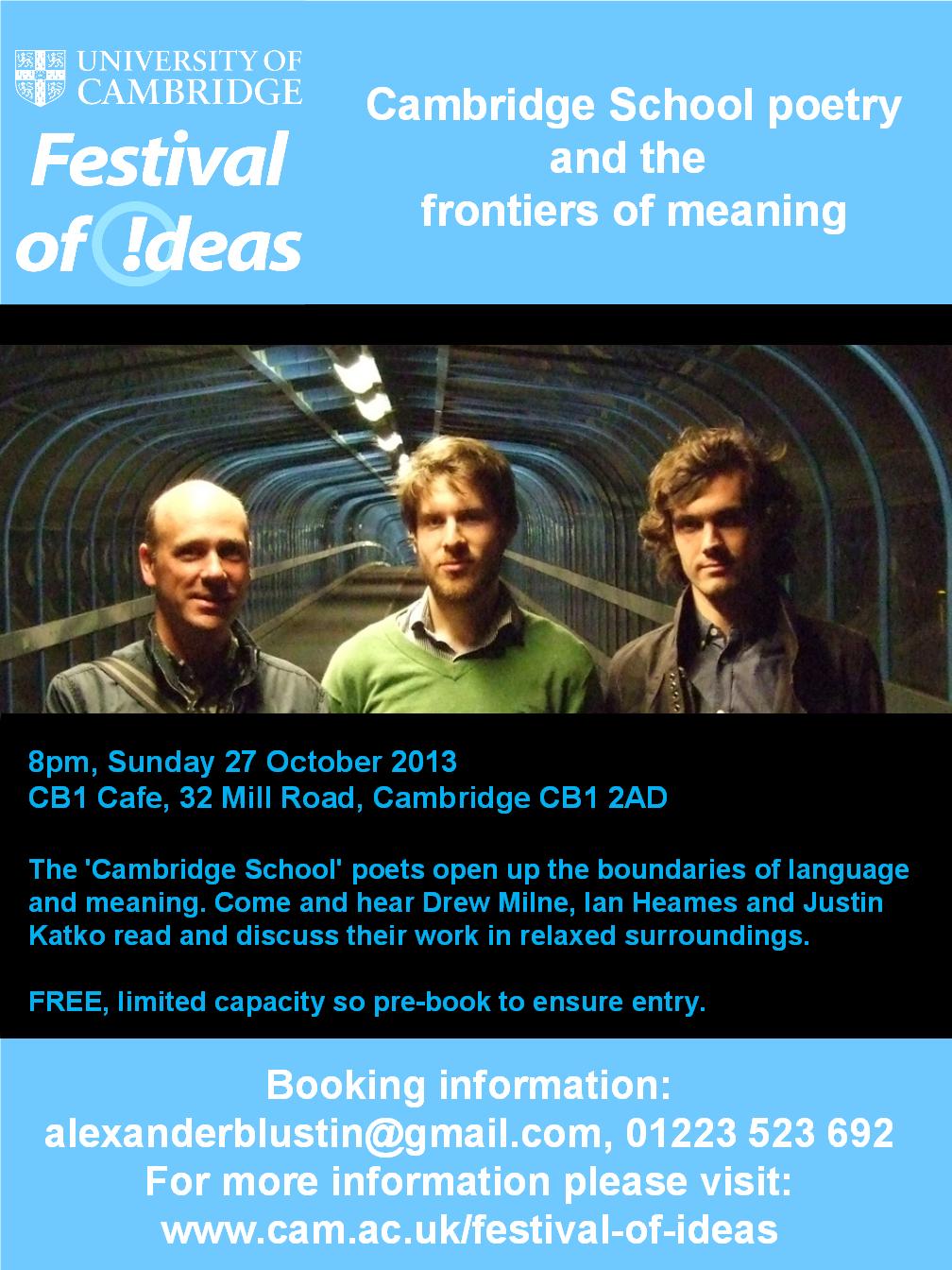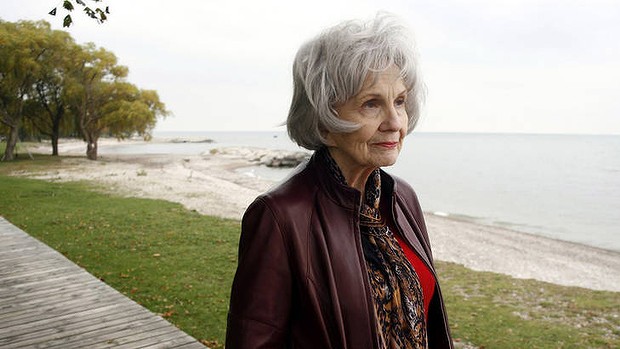Eleanor Catton has just won the 2013 Booker prize with what the Guardian terms an ‘innovative Victorian thriller’ (if that’s not a contradiction in terms). Catton is quoted as saying that her novel The Luminaries was ‘very strongly influenced by long-form box-set TV drama … at last the novel has found its on-screen equivalent’. But what does it mean to be influenced by box-set TV drama?Just a matter of length? Or is there more to it? Something non-Victorian?
Page 8 of 13
CAMBRIDGE GROUP FOR IRISH STUDIES Tuesday 22nd October at 8.45pm The Parlour, Magdalene College Professor EAMON DUFFY (Magdalene College, Cambridge) 'SEAMUS HEANEY AND CATHOLICISM' All welcome Wine and whiskey will flow Any questions to jk10023
Congratulations to Alice Munro, Nobel Laureate. Let’s hope that in her case it’s not the ticket to obscurity that it’s been for Sinclair Lewis, Knut Hamsun and so many others.
But a good year for North American short story writers and an excuse to post Munro’s Paris Review interview, and to recommend ‘The Art of Fiction’ series more generally.
Redell Olsen and Ian Patterson will read from their work. Tuesday 15th October, 8 pm. All welcome. Judith E Wilson Drama Studio, Faculty of English, University of Cambridge, 9 West Road, Cambridge CB3 9DP Redell Olsen's books of poetry include: 'Secure Portable Space' (2004); 'Punk Faun: A Bar Rock Pastel' (Subpress, 2012): see also <http://redellolsen.co.uk/wordpress/>; <http://filmpoems.wordpress.com>. Ian Patterson's books of poetry include: Time to Get Here: Selected Poems 1969-2002 (Salt, 2003); and 'The Glass Bell' (Barque, 2009). see also: <http://ianpatterson.typepad.com>.
*The Poetry of Things* 24th October 3:30-6:30pm, *Museum of Classical Archaeology, Sidgwick Avenue, Cambridge CB3 9DA* Join us for an afternoon of poetry readings and discussion as Gillian Clarke, Imtiaz Dharker, Sean Borodale and Jo Shapcott talk about their recent experiences as poets in residence with the Thresholds project in the University of Cambridge Museums and collections. The poets will be in conversation with Professors Isobel Armstrong and Steven Connor. Drinks afterwards. The Thresholds project coincides with a growing interest in the way that fiction represents objects and the physical world. Questions are being asked about how writing mediates objects, the relationship between the verbal, visual and material and the social life of things. This event offers an opportunity hear poets and literary scholars consider these questions and to join in with the discussion! To read the four poems that will be discussed during this event visit http://www.thresholds.org.uk/ and search under Gillian Clarke, Imtiaz Dharker, Sean Borodale and Jo Shapcott. For more information contact Vicky Mills vm321@cam.ac.uk <mailto:vm321@cam.ac.uk>
 We are pleased to announce a new series of literary talks hosted by Clare Hall. These will take place once or twice a term, and aim to introduce us to some of the most interesting contemporary British writers.
We are pleased to announce a new series of literary talks hosted by Clare Hall. These will take place once or twice a term, and aim to introduce us to some of the most interesting contemporary British writers.
All welcome. Bring a friend. Enjoy a glass of wine, a literary reading and talk, and a lively discussion.
For further information please contact Dr Trudi Tate, tt206@cam.ac.uk.
WRITERS’ TALKS 2013-14
- Ali Smith, Fri 8 November 2013, 6 p.m.
- Francis Spufford, Wed 18 December 2013, 6 p.m.
- Suzanne Joinson, Wed 8 January 2014, 6 p.m.
- Susan Sellers, Fri 14 February, 6 p.m.
- Olivia Laing, Wedn 23 April 2014, 6 p.m.
- Rachel Calder, Literary agent, Frid 20 June 2014
 Here by the sea and sand: A symposium on Quadrophenia
Here by the sea and sand: A symposium on Quadrophenia
Sponsored by the Centre for Modernist Studies, University of Sussex
Falmer, Brighton
11 July 2014
Keynote Speaker: James Wood (Harvard University, The New Yorker)
“I don’t want to be the same as everyone else. That’s why I’m a mod, see?”
Released 40 years ago in 1973, The Who’s ambitious concept album Quadrophenia portrays the 1964 August bank holiday battle between mods and rockers on Brighton beach from the perspective of the young disillusioned pill-popping mod protagonist, Jimmy. Franc Roddam’s iconic film of the album was made in 1979, and in the past year the Who has toured playing the entire album. Quadrophenia, the album, was a comparative failure when released, but has since been recognised by many critics as their masterpiece. Quadrophenia is a complex and multilayered work, combining some of the Who’s most arresting music with a variety of other art forms (Townshend’s story in the liner notes, Ethan Russell’s compelling book of photographs). It is embedded in two sites, London and Brighton, as well as in many more personal and political histories.
The Centre for Modernist Studies at Sussex has decided to live up to its name by holding a one-day symposium on the album and film. Quadrophenia fans, please consider joining us.
Possible topics include but are not limited to: the representation of Mods; Mod revival(s) and nostalgia; Englishness; class; violence; crowds; work; adolescence; masculinity; the relationship between the film and the album; the concept/double album; the accompanying book of photographs and Townshend’s text; influences; legacies; Quadrophenia as rock opera; Quadrophenia in the Who’s oeuvre; the self-conscious representation of the Who’s history; the performance of it in the current moment; pills; punks; godfathers; sea; sand; rain; bellboys.
Paper proposals that mix personal with critical, historical, musicological, or cultural-studies analyses are welcome.
Please send short (300-500 word) proposals for 15-20 minute papers and a short bio of yourself to Pam Thurschwell, p.thurschwell@sussex.ac.uk by 1 December 2013.
6pm– 7pm, Thursday 31 October Two Cultures? FR Leavis on CP Snow Room 3, Mill Lane Lecture Rooms, 8 Mill Lane, CB2 1RW Leavis’s notorious critique of Snow on ‘the two cultures’ was thought at the time to be too aggressive and personal. but it can also be seen to exemplify a recurring dilemma of cultural criticism: how to get a hearing for views that challenge some of society’s most deeply-held yet unexamined convictions. Professor Stefan Collini questions if such offensiveness is unavoidable and legitimate.
The novelist Georgina Harding will be in conversation with James Raven on Thursday 17 Oct at 5.30 in the Parlour, First Court, Magdalene College. Harding is the author of Painter of Silence, which was shortlisted for the Orange Prize last year, and which is set in Romania in the 1950s. All welcome. Email Andrew Phillips on aphillips.cpbt@gmail.com to tell him you’re coming.

